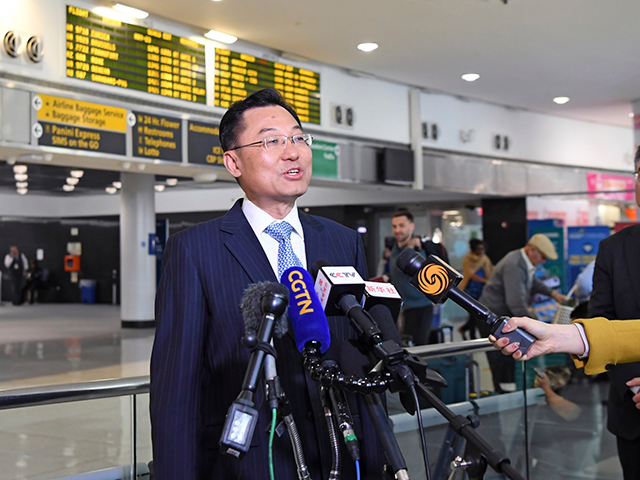Xie Feng, recently appointed as China’s ambassador to the United States, wrote an open letter in English to Americans of Chinese descent on Tuesday, reminding his “compatriots” that “blood is thicker than water,” so they should help their Communist “motherland” prevail over the country where they are citizens.
Xie’s letter was couched in China’s usual weaselly language about “win-win cooperation” and assurances the genocidal regime in Beijing only wants “peaceful coexistence” with the stubborn American government, but it was a naked racialist and nationalist call for Chinese families in the U.S. to set aside their identities as Americans and feel patriotic toward China instead.
Xie touted China’s alleged achievements and urged Chinese-Americans to feel like a part of that success story:
The well-being of each and every one of you is close to the heart of our motherland, just as you all follow her development with deep care. Back home, guided by the blueprint drawn at the 20th CPC National Congress, the 1.4 billion-plus Chinese people are rolling up their sleeves to advance high-quality development and high-standard opening-up, and pursue national rejuvenation through a Chinese path to modernization, so that every Chinese can live a better life. A China marching toward modernity is a boon to the Chinese people and to countries across the world. You are most welcome to visit China often to experience the progress of the country and find opportunities there for self-fulfillment.
Unsurprisingly, Xie did not see fit to mention the startling number of Chinese nationals fleeing their country and slipping across the border into America because they see no future back home.
Xie frankly told Chinese-Americans that Beijing needs their help:
We are committed to the three principles of mutual respect, peaceful coexistence and win-win cooperation put forward by President Xi Jinping, and wish to work with the U.S. to explore the right way for the two countries to get along in the new era. This is my mission as Chinese Ambassador to the U.S. The journey ahead may be long and arduous, but perseverance will take one to the destination. My colleagues and I will rise to the challenge, and work diligently to fulfill our responsibilities. In this process, your support, involvement and contribution would be most valuable.
The ambassador concluded by reminding Americans of Chinese descent that “blood is thicker than water” and inviting them to “feel free to come and visit us at the Embassy.”
Xie’s letter was uncomfortably worded in light of the many Chinese espionage scandals the U.S., Canada, Australia, and Europe have been dealing with lately – including intensive efforts by Chinese agents to recruit citizens of other countries, blatant efforts to corrupt the politics of free nations, and rampant theft of intellectual property.
One of the biggest scandals in Western national security at the moment is China’s network of secret “police stations” operating on Canadian, American, and European soil. The primary purpose of these outrageous installations is to remind Chinese expatriates that “blood is thicker than water” in the most intimidating manner. The regime in Beijing would never tolerate comparable foreign “police stations” operating in secret on Chinese soil.
The Wall Street Journal (WSJ) on Tuesday said Xie arrived at his diplomatic post at “an uncertain moment in relations between Beijing and Washington, as contradictory messages emanate from the two capitals.”
Contrary to the breezy tone of Xie’s open letter, the Chinese are the ones turning away with sour expressions while the Biden administration chatters about thawing U.S.-China relations – and Xie himself has been involved with sending that no-sale message:
On Sunday, following a meeting of Group of Seven leaders in Japan, President Biden struck a surprisingly optimistic note, saying he expected a thaw in U.S.-China relations “very shortly.” His comments came after the G-7 issued a communiqué that called on members to counter China’s “malign practices,” including illegal technology transfers and economic coercion.
On Monday, Chinese Foreign Ministry spokeswoman Mao Ning brushed off Biden’s hopeful remarks, questioning the “sincerity and significance” of American efforts to improve communication with Beijing “while resorting to any means to suppress and contain China.”
Xie’s expected nomination as U.S. envoy was reported by The Wall Street Journal in January. His absence from Washington since then has been seen by diplomats and political analysts in both countries as symptomatic of tensions between the countries.
Politico on Thursday noted that Xie’s open letter has “raised some eyebrows,” especially when taken in concert with another letter he wrote to Chinese students studying in the United States. That letter exhorted students to “tell China’s story well,” an ominous phrase that signals Beijing intends to keep young Chinese studying abroad under even tighter scrutiny, with heavier demands for them to demonstrate political loyalty and push regime propaganda.
Far from being a peacemaker or dealmaker, Craig Singleton of the Foundation for Defense of Democracies described Xie as “the wolf warrior of wolf warriors” – in other words, an aggressive nationalist who “parrots” dictator Xi Jinping.

COMMENTS
Please let us know if you're having issues with commenting.